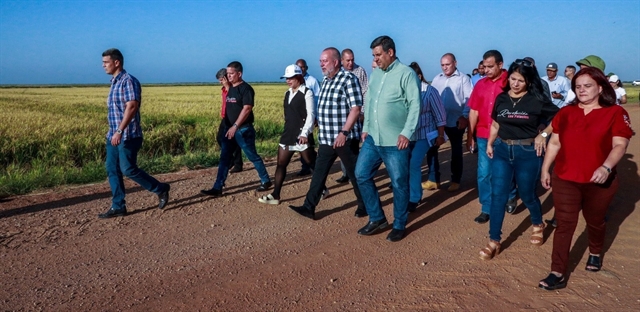 Society
Society

 |
| Officials and engineers of Việt Nam and Cuba visit a rice field grown with Việt Nam's aid in Pinar del Río, Cuba in April 2025. — VNA/VNS Photo |
HÀ NỘI — The Government has issued a decree on Việt Nam’s grant aid to foreign recipients, detailing the provision and management of non-refundable assistance funded by both the central and local budgets.
Comprising seven chapters with 82 articles, Decree No 305/2025/NĐ-CP sets out regulations governing the implementation of Việt Nam’s overseas aid in line with current laws, including the Law on State Budget. It applies to agencies, organisations and individuals involved in the work.
The decree does not cover Việt Nam’s annual dues, mandatory or voluntary contributions to international organisations, and cooperation frameworks or mechanisms of which Việt Nam is a member, nor aid in the fields of national defence and security.
The aid comes in five forms: construction investment, technical assistance, supply of goods, cash grants, and others determined by the Prime Minister. This aid can be provided through programmes, projects, or non-project activities.
According to the decree, the grant aid forms part of Việt Nam’s external policy and is included in annual state budget estimates. Its management must be unified, transparent and coordinated, while ensuring the active role of relevant agencies and units.
Aid provision must conform to Việt Nam’s foreign policy, Constitution and laws, international treaties to which Việt Nam is a signatory, as well as the priorities, needs, and actual conditions of both Việt Nam and the recipient.
In cases where provisions of an international treaty differ from the decree, the treaty shall prevail.
In terms of implementation methods, priority will be given to Việt Nam directly implementing programmes, projects, and non-projects, and handing over results to the recipient, while using Vietnamese goods, services, technologies, human resources and contractors.
Foreign supplies or contractors should only be used when local resources can’t meet the needs, or when they are essential for political, diplomatic, defence, security, socio-economic, or human safety reasons.
Recipients are responsible for taxes, fees and charges related to goods, services and aid activities, as well as compensation, site clearance and resettlement costs, unless otherwise agreed by Việt Nam.
Aid budgets must be used within the allocated year, with any carry-over handled in accordance with regulations on state budget management.
Aid may be implemented directly by the Vietnamese side or transferred as funds for recipients to carry out their own projects. The method of transferring central-budget funds to foreign recipients must be approved during the appraisal of aid proposals or specified in relevant treaties or agreements.
Procedures for approving aid policies include drafting aid policy reports based on approved aid proposal lists, international agreements, minutes of joint committee meetings or high-level discussions, and actual needs.
The Ministry of Finance leads the appraisal, collecting written opinions from the Ministry of Foreign Affairs and relevant agencies. Based on the appraisal, the Ministry of Finance submits the completed aid policy report to the Prime Minister for consideration and decision. — VNA/VNS




